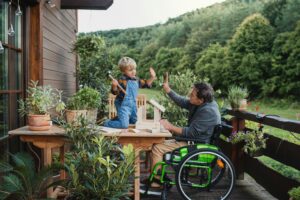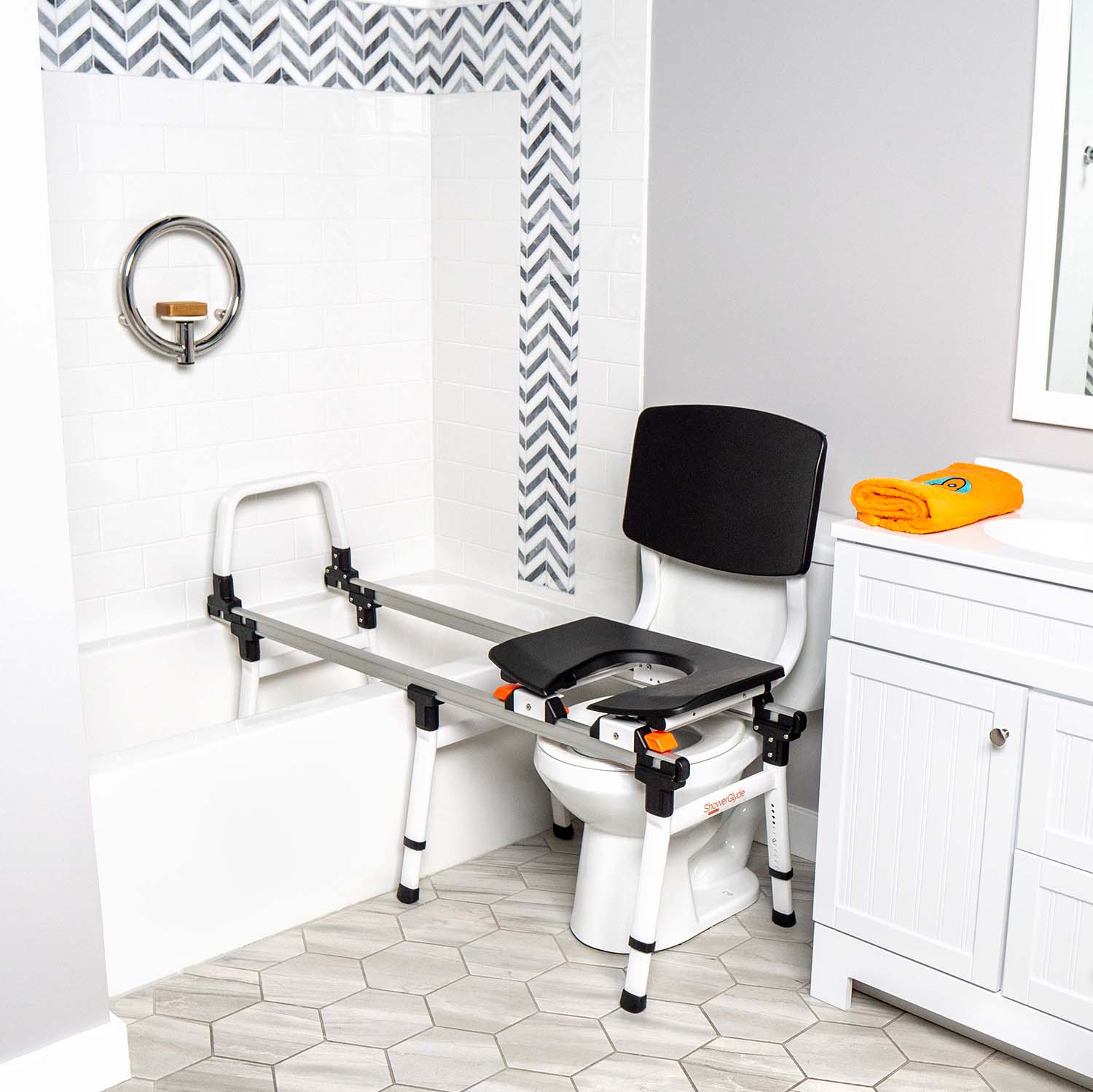September is Healthy Aging Month—a time to celebrate the journey of growing older while promoting well-being and vitality. Amramp believes that aging should be an empowering experience, enriched by healthy habits that enhance quality of life. This blog explores four essential pillars of healthy aging: physical activity, diet, cognitive health, and lifestyle habits, all while emphasizing the importance of accessibility.
#1: Don’t Stop Moving! Engage in Regular Physical Activity
Regular physical activity is vital for maintaining mobility, strength, and coordination as we age. According to the Centers for Disease Control and Prevention (CDC), older adults should engage in at least 150 minutes of moderate-intensity aerobic activity each week (CDC, 2022). Here are some accessible ways to incorporate physical activity into daily routines:
- Find Activities You Enjoy: Start a walking group with your neighbors, visit your local community center for yoga or tai chi classes, or get into standing games like tennis or pickleball. Look for venues that offer accessible options for those with mobility challenges.
- Replace Sedentary Tasks: Opt for low-intensity activities while you engage in other tasks. For example, you can read on a stationary bike, use a desk treadmill while watching your favorite show, or stand while you fold laundry.
- Incorporate Short Activity Breaks: Take brief moments throughout the day to stand, stretch, or do light chores. Simple movements help maintain circulation and energy, making it easier to stay active overall.

Accessibility Tip: Check with your doctor before beginning a new workout regiment, and be aware of your strengths as well as your limitations. Ensure your physical activity options are inclusive by seeking facilities with ramps, handrails, and adaptive equipment. This creates a welcoming environment for everyone.
#2: Nourishing the Body and Mind with a Healthy Diet
A balanced diet is essential for healthy aging, influencing everything from energy levels to cognitive function. The World Health Organization (WHO) states that a healthy diet can prevent malnutrition and reduce the risk of chronic diseases (WHO, 2020). Here are some dietary tips to promote health in later years:
- Emphasize Whole Foods: Focus on a diet rich in fruits, vegetables, whole grains, lean proteins, and healthy fats. The Mediterranean diet, for example, has been linked to a lower risk of cognitive decline (Martínez-Lapiscina et al., 2013).
- Eat With Friends: Research on the Blue Zones show that social meals enhance enjoyment and promote healthier eating habits. Gathering for meals not only fosters emotional connections but also encourages mindful eating (Buettner, 2012).
- Plan Your Meals: Accessible meal planning can include easy-to-follow recipes or community cooking classes tailored to various dietary needs.
Accessibility Tip: When you’re having social meals, make sure you cater to different dietary needs and physical limitations. For example, ergonomic utensils can be helpful for people with arthritis.
#3: Keep Your Mind Sharp to Sustain Cognitive Health
Cognitive health is crucial for overall well-being as we age. Engaging the brain can help reduce the risk of cognitive decline. The Alzheimer’s Association states that cognitively stimulating activities can lower the risk of developing dementia (Alzheimer’s Association, 2021). Here are strategies to support mental acuity:
- Lifelong Learning: Participate in continuous learning through classes or online courses specifically designed for older adults, enhancing cognitive function and emotional resilience (Bäckman et al., 2001).
- Brain Games: Do puzzles and play memory games that challenge the mind. Many apps and websites offer accessible brain-training games tailored for seniors (Owen et al., 2010). My mom loves Words with Friends!
- Stay Hydrated: Hydration is vital for cognitive function. Studies show that even mild dehydration can impair cognitive performance (Maughan & Noakes, 2000). Keep a glass or bottle of water on your bedside table and drink 8-12 ounces to start your day to stay on track. You will ultimately want to consume about half of your body weight (in pounds) in ounces. So if you weigh 150 pounds, you will want to aim to drink 75 ounces of water each day.
Accessibility Tip: Ensure that cognitive activities are accessible by customizing settings to suit your needs. For instance, when playing brain games on a computer, phone, or tablet, increase the font size and adjust the brightness to minimize eye strain.
#4: Create a Supportive Environment with Healthy Lifestyle Habits
Healthy lifestyle habits can change the way you live your life, from the way you sleep to the ways you manage stress. Here are a few areas to focus on building your best habits:
- Quality Sleep: Establish a bedtime routine that promotes restful sleep. Our bodies repair our cells, muscles, and tissues while we sleep, so getting a good night’s sleep is more than just a beauty rest!
- Stress Management: Engage in mindfulness, meditation, or deep-breathing exercises. Mindfulness practices can significantly reduce stress and improve mental health (O’Caoimh et al., 2019). Try starting with these breathing exercises from the American Lung Association.
- Accessible Living Spaces: Opt for home modifications that promote safety and accessibility, such as grab bars in bathrooms and non-slip mats. A safe environment fosters independence and confidence, reducing the risk of falls—one of the leading causes of injury among older adults (Stevens et al., 2016).

Accessibility Tip: Your mobility may be different from others, so making your own home as accessible as possible will ensure safety and usability for everyone who visits.
Conclusion
As we celebrate Healthy Aging Month, let’s focus on empowering individuals to embrace their journey with vitality and grace. At Amramp, we are committed to promoting inclusive practices that enhance physical activity, nutrition, cognitive health, and overall lifestyle. Together, we can make every moment count by creating a community that supports healthy aging for everyone. View our accessibility products and reach out to us for a free evaluation to make your home more accessible for everyone.
References
- Centers for Disease Control and Prevention (CDC). (2022). Physical Activity Basics.
- World Health Organization (WHO). (2020). Healthy Diet.
- Martínez-Lapiscina, E. H., et al. (2013). Mediterranean Diet Improves Cognition in the Elderly.
- Alzheimer’s Association. (2021). Cognitive Health and Aging.
- Bäckman, L., et al. (2001). Cognitive and Social Interventions in Aging.
- Bennett, J. M., et al. (2014). Social Ties and Cognitive Health Among Older Adults.
- Owen, A. M., et al. (2010). Putting Brain Training to the Test.
- Stevens, J. A., et al. (2016). The CDC Compendium of Effective Fall Interventions.
- O’Caoimh, R., et al. (2019). Mindfulness and Mental Health in Older Adults.



